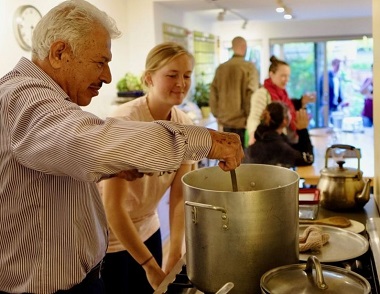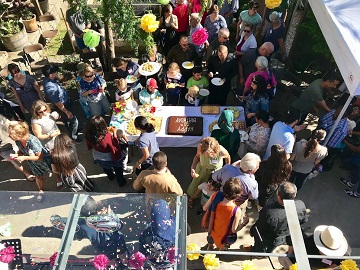
Anika Barlow (second from left) joins refugee claimants to cook and eat meals together every Tuesday night. Photo: Mark Janousek
I live in East Vancouver just off Commercial Drive. My house looks like a nondescript ‘Vancouver Special’ from the street, but it’s far from ordinary by our city’s standards. Over the past two years, I have shared my home with more than 50 people from over a dozen countries.
On Tuesdays, we cook and eat dinner together, and most other days we share tea in each others’ apartments or conversation in the backyard. While Vancouver suffers from a crisis of isolation, my own days unfold within a rich community. I live with refugee claimants.
Many of my peers’ experience of living in Vancouver is marked by loneliness. I hear this repeatedly in conversation with other young adults, and read it in the statistics of reports such as the Vancouver Foundation’s Connect and Engage survey of 2017.
We know how to talk about ‘community,’ but we’ve forgotten what it feels like, and we wonder if ‘neighbour’ might be too strong a term for the people who live next door.
Life with refugee claimants at Kinbrace Community Society couldn’t be more of a contrast.
I can’t help but think that the refugee claimants I share a hallway with have something critical to offer us in neighbourhoods across the Lower Mainland. We might be tempted to blame Vancouver’s lack of social cohesion on the housing market and precarious rental arrangements.
Yet, the refugee claimants who I have encountered are living in transitional housing, awaiting a refugee hearing which could be two years away, and pursuing integration into Canadian society with no guarantee of being granted protection in Canada.
What could be more precarious?
All the while, these refugee claimants extend trust and hospitality through invitations into their transitional homes. They extend friendship beyond linguistic barriers by delivering a bowl of soup to a neighbour who is sick. They challenge the value I place on productivity by embodying a different value system governed not by time and tasks but by relationships and presence. They offer an alternative way of relating to each other, where being neighbours implies mutual concern and interconnection, rather than incidental proximity.

Many former residents returned to Kinbrace when it celebrated 20 years of welcoming refugees last summer. Photo: Mark Janousek
Twenty years ago, refugee claimant families who moved from Kinbrace could afford to rent in East Vancouver. In the last two years, these families have been moving as far as Port Moody, Richmond, Coquitlam and Aldergrove. I worry for them, knowing that they are leaving a tight-knit network of support and facing yet another form of displacement.
At the same time, however, I am strangely grateful for the nameless forces pushing people east and south, far from this nondescript Vancouver Special.
I think of the community-building acumen that these refugee claimants bring when they settle into new neighbourhoods, schools and workplaces. I think of six year old Ahmad who, unbeknownst to his mother, would invite me in for tea. “Five minutes,” he would say, standing in his doorway. And it was never five minutes.
In the Canadian context, the economic and demographic arguments to support increased refugee resettlement have been given ample airtime. The social reasons, however, are not part of the current public discourse. These are derived less from statistical analysis and more from the simple daily interactions which build the kind of city where my peers want to live.
Perhaps it’s time to move from the political to the personal in how we talk about refugees – to stop asking “How many can we handle?” and start asking “Have you met Mohammed?” We might be surprised, in responding to the needs of our refugee claimant neighbours, that our own needs are miraculously met.
Anika Barlow is a community coordinator with Kinbrace Refugee and Housing Support. This comment first appeared in The Vancouver Sun and is re-posted by permission of the author.
